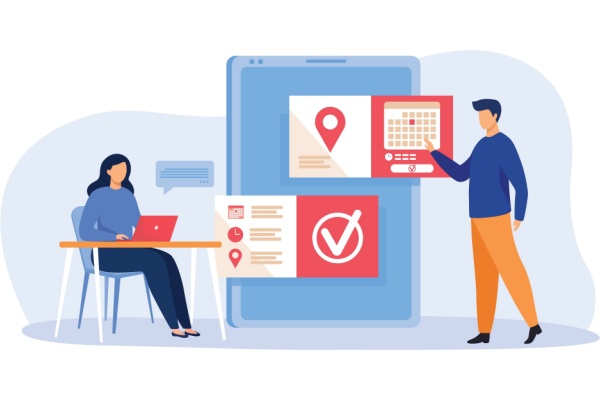Once you’ve got a reliable B2B business leads pipeline, your focus shifts from getting those business leads to identifying, nurturing, and closing them in order to make sales. But not all business leads are created equal. You shouldn’t spend the same amount of time on every one that comes across your doorstep. Many companies have great website traffic, visitor engagement and repeat visitors that could all be considered warm leads. Developing specific scoring criteria on what is and isn’t a lead can be the difference between salespeople wasting their time and investing it against real prospects.
So how do you determine which business leads are ready to commit to a purchase, which ones are lukewarm and need nurturing, and which are just kicking tires and not worth spending any time on?
Many advantages of a B2B business leads scoring system
The way to answer those questions is to create a B2B business lead scoring system. Lead scoring gives each one of those sales leads a ranking based on their activities – whether that’s on your website or through any of your content marketing devices, e.g. newsletters, blogs, podcasts, video, social media posts or ads. The lead scorecard for each company will differ but not having one means there is no benchmark for determining what you classify as a sales-ready lead.
The power of scoring business leads goes beyond simply boosting sales. You will find that it gives both sales and marketing a common language that helps to align them. Marketing will have a numerical value for each lead and can alter inbound marketing to target specific factors to generate more leads that meet specific criteria. It also allows marketing to better refine its messaging for top leads, testing approaches that might not work for less interested leads. For instance, you might be able to contact these leads more often or be more aggressive with your calls to action (CTAs). It also allows you to identify those highly satisfied customers who can act as champions for your company, especially when given encouragement through a targeted campaign.
How to keep score of B2B business leads
Setting up a scorecard can be relatively simple, by identifying the most important factors and giving them more weight than the “nice-to-haves.” First you need to establish the minimum criteria by which a customer is defined. These are qualifying persona characteristics, like: Must be in a specific service area, or Must be 21 years of age or older. Then, identify the qualities that your targets usually possess. These are common but not necessarily essential, like the table stakes criteria we just discussed. The marketing department should be able to provide data here as they’ve likely done extensive research into who your typical customer is.
Third step is to identify your ideal customer, those who the sales team would regard as having the most potential. What makes one prospect better than another? Someone in control of a certain size budget? A short timeframe in which to make a purchase?
Now that the characteristics have been listed it’s time to assess the behaviour of leads, the kinds of activities that suggest their level of interest and readiness to purchase. These activities are what moves them up or down the rankings, depending on the kind of activities they’ve engaged in and how frequently they’ve interacted.
Make a list of behaviours
Begin by listing all possible behaviour business leads can engage in. While some behaviours are more important than others, it can be helpful to assign a point value to all behaviour (even if it is a very small value). So, don’t leave anything out just because it seems unimportant. Your scorecard should include site visits, fill forms, download requests, webinar participation and more. Here are some of the lead’s activities that earn points in the lead scoring model:
- Visited a webpage/landing page
- Number of website sessions
- Participated in a webinar
- Looked at pricing
- Started a free trial
- Filled out a contact form
- Downloaded a lead magnet, like a white paper
- Opened an email and clicked on hyperlinks within
- Clicked on a link in a newsletter
- Replied or forwarded an email
- Shared content on social media
Some of these behaviours will be “critical conversion behaviours” (activities that most of your business leads do prior to becoming customers). These might be things like signing up for a free trial or requesting a sales demo. A thorough analysis of your Google Analytics data should make these defining behaviours obvious. Mark your critical conversion behaviours with a star so you can give them appropriate emphasis when it’s time to assign points to rules.
Assigning points
For most companies a straightforward 1-to-100-point model will be enough. For B2B lead generation, a company might want to use a thousand-digit ranking, giving small, medium and large businesses a 1, 2 and 3 first digit. So, a business lead with a score of 3062 would be a large company with a 62-point score. Another technique is to define the three (or more) minimum criteria – “table stakes” – to be considered eligible as a lead. If you assign 100 points to each of these, and decide they need to have at least three of these essential characteristics to qualify, then a lead with a score of 435 would go into the pool, but one with a score of 282 would not. This ensures that a bad sales lead never makes its way to the sales team, no matter how many of the behaviour rules they trigger.
Reassess lead scoring criteria regularly
Setting up a business leads scoring system can be as simple, or as complicated, as you can get, given your marketing data. You’ll have to tweak it as you use it and check it against conversions regularly to ensure you have set up a system that works. Remember: no matter how qualified a lead is, some will never convert. So be prepared to see some inconsistencies when reviewing results.
We know all about lead scoring because we’ve implemented it for dozens of our B2B clients in all kinds of industries. In fact, the right lead generation company can help you secure more business leads.






